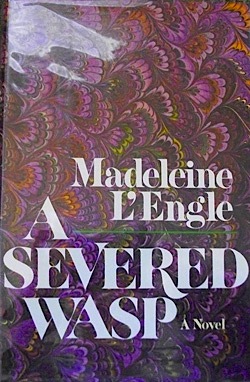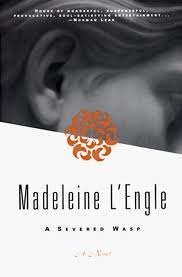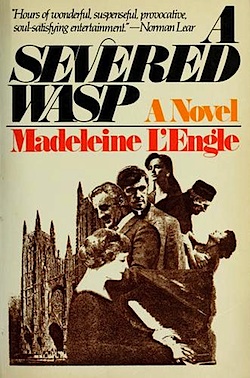“I don’t wish to be defined by gender or genitals. I am a pianist.”
— Katherine Vigneras
Having written novels focused on the emotional angst of young and middle aged adults, in the 1980s Madeleine L’Engle set off to write something a little different: A Severed Wasp, the novel of an elderly woman coming to terms with her life. Set mostly in New York City, but with multiple flashbacks to Europe, the novel also functions as a little mini reunion of L’Engle characters, featuring Suzy Austin from the Austin novels; Dave Davidson from The Young Unicorns, and Mimi Oppenheimer from A Winter’s Love. (Philippa Hunter from And Both Were Young also gets a mention.) It is a novel of human pain, and our reactions to it, and how we might be able to survive.
And, despite its focus on a Manhattan cathedral, it does not quite provide the answer you might expect from L’Engle.
Katherine Vigneras is an atypical L’Engle protagonist, not merely because of her age, but because of her confidence in herself and her artistic skills. A deserved confidence: Katherine is a world renowned pianist who has traveled the world and made several critically acclaimed recordings. Music has become almost her entire focus, to the point where she thinks and reacts musically and is irritated when others do not. In a splendid moment, she is furious when the cathedral tells her that her planned concert will have to be moved to a larger venue to accommodate her popularity, since the tickets for the original venue have sold our and they intend to sell more. Rather than feel any thrill, she acidly points out that the change will entirely mess up the acoustics and thus the music she has chosen, meant for a smaller room. And then she immediately begins to plan for the larger room. Her focus on music has limited her knowledge of other things: she has apparently never, for instance, watched television or missed it.
She is also, unusually enough for a L’Engle heroine, often unlikeable, with her egotism and self-centeredness. In just one revealing moment, while she is thinking about her late husband Justin, she notes, “And he betrayed me by being castrated in one of the ‘medical experiments’ in Auschwitz.” And that kinda sums up Katherine right there.
At the same time, this egotism and her sharpness makes her one of L’Engle’s best realized characters, and the parts about growing old and accepting your life and its limitations feel very real indeed. I also love her response to a man who is trying to excuse cheating on his pregnant wife with a man by saying that men and women just have “different needs.”
At that, she looked at him with astonishment. “Good Lord, I thought that went out with the nineteenth century.”
Katherine has just enough self awareness to realize that she has failed others, and deeply, and this failure—particularly her relationship with her daughter, described movingly, troubles her, until she sits down at the piano. And for some reason, despite her egotism, occasional brashness, and fragility, pretty much everyone in New York City has decided to confide their problems to her. Perhaps because they realize once she’s at the piano, her main concerns will be acoustics, not them. Or because if Katherine is not always a sympathetic listener, she can provide nuggets of fierce wisdom, as whena woman complains to her that Manhattan will not allow women to be just women, they must also be something, a claim that Katherine—who is, after all, already something—emphatically rejects.
And wow, does everyone have a lot to confide: drug use, finding out their lawyer husbands are having affairs with hot men; child abuse by contemporary neo-Incan priests (complete with human child sacrifice!); the recent deaths of wives in childbirth; the nasty little story that the Bishop’s first wife is now a nun and his second wife is a pop star who was never going to be a great singer anyway, and LOTS MORE. I could not help remembering that L’Engle’s husband worked as an actor in soap operas for years; something of that seems to have bled through here.

Anyway, not everyone welcomes Katherine’s presence, as she begins receiving a series of genuinely nasty phone calls. Someone breaks into her apartment, slashing her beloved painting by Philippa Hunter, and the community decides, to Katherine’s irritation, that she needs to live with others until the perpetuators are found. It creates a mystery that weaves around the mysteries and revelations of Katherine’s own life, as she spends time remembering and reconciling with her past.
It’s a page turner (that soap opera effect), despite, or perhaps because of, all of the increasingly improbable coincidences. But still, the novel breaks down for me in three different places.
The first is when Katherine falls in love with her Nazi jailor.
Yes, this is after the war; yes, her marriage is in a terrible place; yes, Lukas is a somewhat “better” Nazi as Nazis go; yes, Katherine is brutally scarred by her war experiences; yes, L’Engle believed in love and forgiveness, and is trying to show, here and elsewhere, that the best response to darkness and hatred is love. Yes, the Nazi in question says that he is not trying to avoid responsibility, and yes, this happens after Katherine has been horrified at what the Americans did in retaliation for the war. (While she is in prison, he mentions his admiration for her mother, but they do not enter a romantic relationship until then.)
But the man still willingly joined the Nazi party and admits later that he did so because he believed they were creating a better, purer world. The same party that, leaving all else aside, within this book alone broke her husband’s hands, sent him to Auschwitz, conducted medical experiments on him, and castrated him.
And this is right after Katherine reacted with horror at the idea of sleeping with a Catholic priest. (To be fair, that was also a terrible idea, but, still.)
I can’t buy it.
I understand, to an extent, what L’Engle is attempting to do here, but quite apart from my exasperation that this is her third book* where the only concentration camp survivors are French resistance fighters, I cannot accept that Katherine, whose marriage is in trouble because of the Nazis, would turn around and sleep with one of them. Unless, of course, she was attempting to hurt her husband in the absolute worst way possible—and given his demands that she sleep around and give him a child so that no one in the greater world will find out that he’s been castrated, I can see the need for revenge.
*The other two books are And Both Were Young and A Winter’s Love; we’ll be looking at A Winter’s Love later in the reread.
But I still can’t buy any of this.
(It probably doesn’t help that an early scene has the Jewish Mimi Oppenheimer apologizing to Katherine for assuming that everyone who went to Auschwitz was Jewish.)
The second problem is L’Engle’s depiction of homosexuality. L’Engle does provide one sympathetic bisexual character, Felix, but the other bisexual and gay characters are distinctly unsympathetic, even villainous (and handled less sympathetically than the Nazi), and L’Engle consistently portrays homosexual acts as harmful, suggesting that happiness can be achieved only once gays and bisexuals stop being gay and bisexual. And even Felix, after achieving happiness through celibacy, is tortured with constant threats of exposure that are undermining his health, and guilt over his feelings for a younger man. And the only two bisexuals portrayed as not preying on, or potentially preying on, or harming children, are the two bisexuals (a lawyer and an actor) cheating on their wives, presented as distinctly unsympathetic individuals.
 I recognize that much of this reflects the attitudes L’Engle was brought up in, and that this is tame and even, in the case of Felix, enlightened compared to other depictions of homosexuality at the time (1982). But I am still troubled that in a book where cheating on your husband with a Nazi officer is presented as a joyful, healing event, not one gay or bisexual relationship can be portrayed as good or potentially healing.
I recognize that much of this reflects the attitudes L’Engle was brought up in, and that this is tame and even, in the case of Felix, enlightened compared to other depictions of homosexuality at the time (1982). But I am still troubled that in a book where cheating on your husband with a Nazi officer is presented as a joyful, healing event, not one gay or bisexual relationship can be portrayed as good or potentially healing.
And this leads to my third concern. Katherine is told, in graphic detail, about a case of clear same-sex child abuse, combined with drug dealing. And does she or anyone else call the authorities? No. Katherine tells one of the women to head to confession and promises to stay silent, and then goes and plays the piano. This is purely in character for Katherine, and a beautiful bit of characterization, but it is all wrong for the other characters in the book, and it leaves the book on a chilling note.
A Severed Wasp has moments of great beauty and wisdom, and several quotable moments. It offers insightful analysis of the frustrations of women, particularly artistic women, in Manhattan, and powerful portrayals of the power of love, and what a marriage can endure. Its soap opera roots keep the plot moving, and almost allow me to buy the final coincidences in the last few pages, which to be fair were telegraphed earlier on in the book. And the portrait of Katherine is one of L’Engle’s best and most convincing. I also love the quote I used to introduce this post. But for all this, it leaves me uneasy, and I am not sure if that was L’Engle’s point.
Mari Ness‘ grandfather fled to the United States from Germany shortly before World War II. Not all of his relatives followed.










